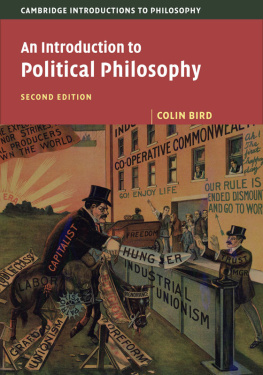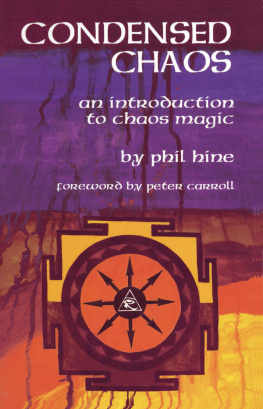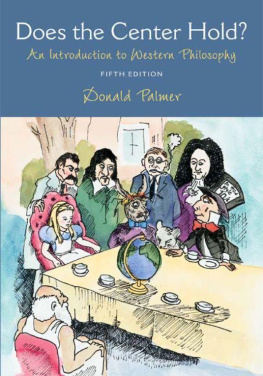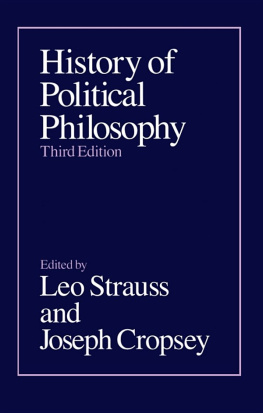Political Philosophy
A complete introduction
Dr Phil Parvin & Dr Clare Chambers
Phil Parvin and Clare Chambers have produced a state of the art textbook, which provides students with a comprehensive and bang up-to-date introduction to contemporary political philosophy. Topics are introduced in a clear and eminently readable fashion, using accessible real world examples whilst drawing on sophisticated scholarly literature. There is no comparable book which covers such a wide range of topics in such a student-friendly manner.
Dr Daniel Butt, Lecturer in Political Theory, University of Bristol.
A lively, accessible and engaging read. Comprehensive and well organized, it provides an updated account of key concepts in contemporary political philosophy, and highlights their relevance to political life in the 21st century. A valuable book for anyone taking their first steps in the world of political philosophy, or anyone who seeks to understand the normative challenges faced by our society today.
Dr Avia Pasternak, Lecturer in Political Theory, University of Essex.
Written in a clear and accessible style, it is an engaging introduction for those who are new to political philosophy and wish to think through some of its most important questions. In addition to offering outlines of key arguments, each chapter also contains a summary of main concepts, self-test questions, a wonderful selection of quotations and some attention-grabbing nuggets
Dr Zosia Stemplowska, University Lecturer in Political Theory, University of Oxford.
For Harley and Caspar
Contents
Introduction: What is political philosophy?
Does the state have the right to tax its richer citizens in order to give to those who are worse off? How can we defend the idea that human beings have rights? How can we ensure equality between women and men? Do rich states have a moral obligation to give some of their wealth to poorer states? Should a democratic state follow the will of the majority, even if doing so would result in the persecution of minority groups?
Political philosophers ask questions like these and attempt to answer them! Political philosophy interrogates our assumptions about politics, society and the relations between individuals. It is therefore different from other areas of political inquiry. Most political science is descriptive: it seeks to describe and explain political phenomena through empirical data. Political philosophy, on the other hand, is primarily prescriptive rather than descriptive. Political philosophers may use the empirical evidence gathered by political scientists, but our aim is not to describe the world as it currently is but to determine how it ought to be. Political philosophy is normative: political philosophers are concerned not with what is efficient or economical, but with what would be morally right or wrong.
Political philosophy is exciting and important: as political philosophers we raise profound questions about the way we live our lives, the values that we hold, and the social and political institutions that regulate our lives. We ask why society is structured in the way that it is, and whether it should be structured differently; why we have the values that we do and whether they are the right ones; and on what grounds states, individuals and other organizations can justify their actions.
Political philosophy is also challenging. It requires us to think critically and deeply about issues that may seem settled or obvious or, alternatively, abstract and hard to grasp. In political philosophy we reason analytically about the nature of human beings, and about concepts such as freedom, equality, power, authority and justice. Members of liberal democratic states like Britain and the USA often take the meaning and value of these concepts for granted; political philosophy forces us to confront our assumptions.
Themes and structure
The book is split into two parts. In the first we discuss the meaning of some of the most fundamental concepts that we use to understand politics, the obligations individuals living in a society have toward one another, and the institutions that we create to regulate our public and private lives. The second part is devoted to a discussion of the different normative arguments which have divided Anglo-American political philosophers, and have served to shape the conduct of the discipline for the last half-century.
It is important to begin with conceptual analysis. It is too easy to assume that the meaning of fundamental concepts is settled simply because we are used to invoking them in a particular way. We are all used to appealing to ideas like freedom or equality or rights in political debate: such concepts provide the background context within which we debate more specific policies or government actions. But while we may be used to debating which policies are most in line with our most cherished ideals and values, it is not often that we go further and question these ideals and values themselves. What do we mean by freedom, or equality, or justice, or democracy? Why should we value these things? The fact that ideals like freedom and equality are widely supported in our public culture is not a good enough reason for valuing them: many practices and values, widely supported at one time or another by the citizens of liberal democratic states like Britain, have been subsequently rejected for being unjust; moreover, many just practices and values are not currently the subject of widespread agreement in liberal democratic states.
We need to know what ideas mean, and how they are justified, in order to know how important they are. This is crucial because we often have to choose between competing values. Should we prioritize freedom or equality, if they conflict? More fundamentally: how do we go about answering such a question? Similarly, how do we deal with the choice between security and civil liberties? And if we are forced to choose between respecting the rights of a child (for example, to receive an education which prepares them for an autonomous adult life) and the rights of parents (for example, to remove their children from formal education on the ground of religious beliefs), how are we to decide?
Some argue that the answers to these kinds of questions are provided by important documents or accepted practices: bills of rights, international agreements, constitutions and so on. But complex political questions cannot be resolved simply by recourse to legal precedents or constitutions.
Firstly, constitutions are particular to different nation-states and political regimes. The conceptual context set by the US constitution only holds for the US, and similarly the provisions embodied in the constitutions of Australia, Thailand, Iran, Britain and everywhere else only hold for those states.
Secondly, whether something is constitutional and whether it is right or just are very different questions. Constitutions can be unjust, as can international agreements and other formalized political practices. Hence, we need deeper grounds than constitutions and international agreements if we are to know how to order our political lives. We need deeper grounds than constitutions and international agreements if we are to evaluate and (perhaps) criticize constitutions. We need normative debate about politics.
Thirdly, constitutions, international agreements and so on are themselves products of prior (and ongoing) philosophical, political and legal debate. True, we need a (conceptual, philosophical, moral) framework within which to undertake the difficult work of resolving complex questions about how to order our social and political lives, what institutions we need, why we need them, who should hold power, and what the limits of this power might be, and so on. We need a principled foundation of concepts and ideas that we can draw on in our discussions about specific questions. And, true, in the modern world these foundations tend to be provided by important documents like the Universal Declaration of Human Rights. But these documents are the distillation of years of philosophical debate about who we are and what kind of world we want to live in, and are themselves characterized by internal tensions and ambiguities. Constitutions, like international agreements, treaties and other formal documents which stipulate fundamental powers and responsibilities on the world stage, are works in progress.













